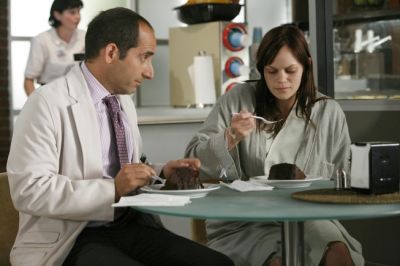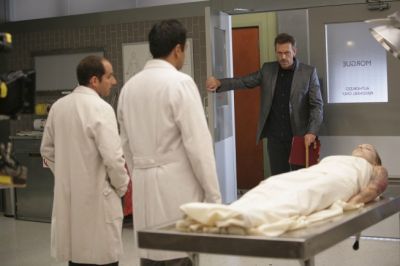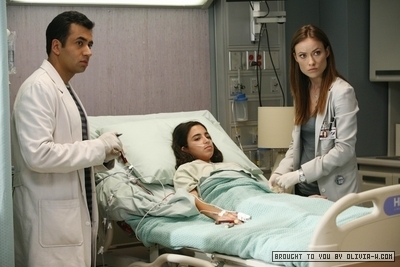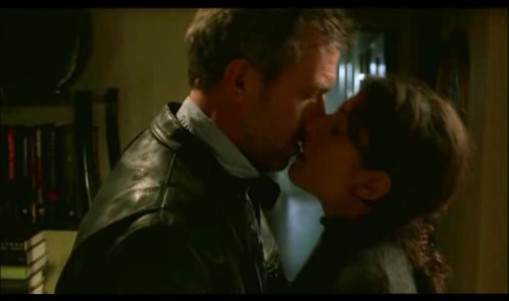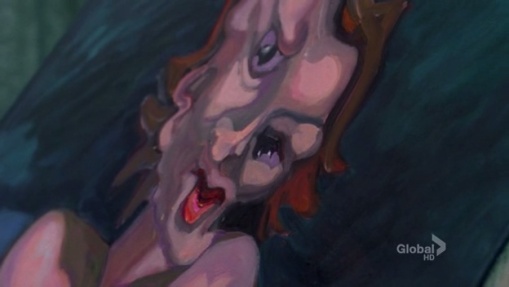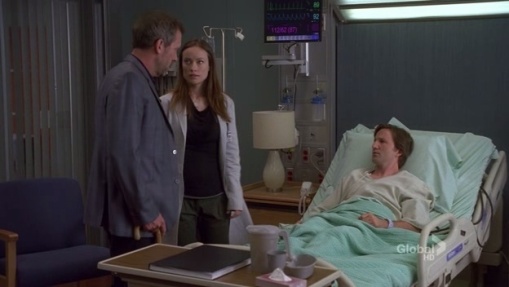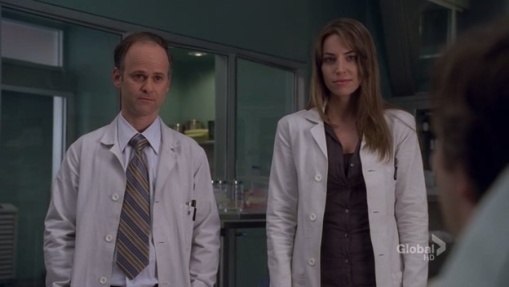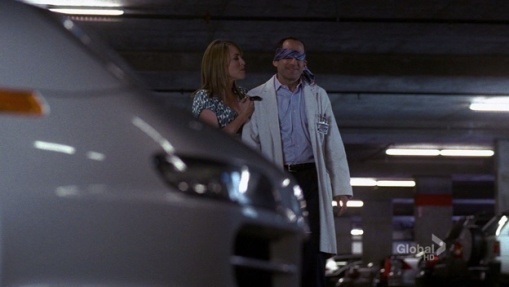The Wife:
It might just be me, but I think this week’s patient of the week is actually the saddest, most depressing patient of the week I’ve seen on House in awhile. Poor Natalie. Overweight and mocked by her peers, Natalie spent up until six months ago downing two or three bottles of vodka per week. Cuddy, helping with the diagnostic while Foreman continues his clinical trials, takes a shine to the sixteen-year-old, seeing something of herself in her. Despite her low self-esteem and alcoholism, Natalie is a model student. School is the only thing she’s good at. She tells Cuddy that even though she bought a lot of liquor, she didn’t really drink all of it. She was just buying it because a popular boy that she liked and was once very good friends with happened to be selling it. Poor Natalie’s liver and heart are failing, and Cuddy is desperate to save her, which House thinks is some kind of misplaced maternal feeling that Cuddy has been harboring since she lost her chance to be a mother. Unable to find a solution, Cuddy and House start to think that the girl may have very advanced leukemia. Cuddy wants to start her on treatment immediately, but House warns her that if she can’t get a new heart and a new liver, there’s no point in treating her for the disease. Bewildered at the fact that House seems like he just doesn’t want to try to save this patient and is content to let her die, Wilson reminds Cuddy that House is actually being kinder to Natalie by not forcing her to go through chemotherapy if something else that they can’t fix is going to kill her anyway.

You think the bangs are too much, don't you?
On advice from Wilson, House tries actually not being an asshole for a change, agreeing to even take on clinic duty when he isn’t scheduled to do so. In clinic, House has to try very, very hard to not be his usual curmudgeonly self. He meets a patient that he pronounces pregnant, despite her protestations that she and her fiancé are both virgins. Not wanting to admit what House assumes was some pre-marital infidelity, House tells the woman that perhaps it is possible for her to have gotten pregnant from skin-to-sperm contact when she admits that she and her fiancé do “other stuff” in bed. He then meets a woman who claims her inhaler isn’t helping her asthma. When House asks her to demonstrate how to use her inhaler, she proclaims that she isn’t an idiot and proceeds to spritz the inhaler over her through like a perfume atomizer. We then see her storm out of the clinic in a huff. (I guess House briefly reneged on his promise to be nice, and that woman indeed deserved it.) The pregnant girl returns to House with her fiancé in tow, who demands a paternity test. Hours later, House presents them with evidence that the girl conceived immaculately and that, in seven months, the couple would have a daughter with only maternal DNA. House tells Cuddy about faking the paternity test to save the woman’s marriage, which makes Cuddy realize that her patient, Natalie, doesn’t have leukemia at all. She has eclampsya, a complication from pregnancy.
When Cuddy presents this information to Natalie, her parents are stunned to hear that their daughter concealed a pregnancy. Cuddy points out that they likely didn’t notice because Natalie is a heavier girl and her body and boxy school uniform did most of the work of concealing her growing child. Like any father, Natalie’s dad’s first reaction is “who did this to you?” Natalie says that her one remaining friend, the jock boy she bought booze from, is the father of her baby. She had quit drinking when she realized she was pregnant in the hopes that she could have the child and give it up for adoption. Tearfully, Natalie recounts the story of the birth, bearing her child in an alley behind the soup kitchen she volunteered at, realizing that the child wasn’t breathing and leaving the baby in the alley, gently covered with Natalie’s coat. Even with the news about her child, one of the contributing factors to her low self-esteem and depression, out in the open, Cuddy has to tell the poor girl that if she doesn’t get a new heart and liver, she will be dead within days.
Cuddy goes off to do some detective work on her own and somehow tracks down the couple of crack addicts who found Natalie’s baby and convince them to give the little girl to her so that Natalie can hold her child before she dies. Kutner is so upset by the fact that school bullying caused Natalie so much pain and decides, with the additional blow that the girl has been refused a spot on the donor list because of her advanced condition, to track down some former classmates of his. He apologizes to them for bullying them in high school, officially making Kutner the exact opposite of what we all thought he’d be. Taub was so certain that Kutner identified with the case because he, too, was bullied as the adopted Indian orphan of murdered parents. Meanwhile, Natalie’s parents refuse to care for the granddaughter, finding the entire situation to be too painful and House, still trying to be a good person, asks Cuddy if she plans to adopt the little girl. Cuddy tells him that she’s already spoken to a lawyer and that she’ll get to be the child’s foster parent first and then, after a certain amount of time in foster care, Cuddy can apply to adopt.
Meanwhile, in a story that is almost completely unrelated, Janice, Thirteen’s new friend from clinical trials, has dropped out. Thirteen tracks her down to find out why, and she says it’s because Foreman didn’t take her nausea seriously enough. She found him to be too cold and didn’t want to deal with the trials anymore if he was going to be on it. Thirteen asks Foreman to apologize to Janice and try to get her back on the trial. When he refuses, Thirteen tells him he’s become Dr. House. After Foreman’s partner on the trials tells him that being part of House’s team and thus being able to see the trial patients only as numbers, not as people, is why she picked him for the job, he realizes that he doesn’t want to be like House, and goes to find Janice to ask her to join a lower-dose trial of the same drug, hoping it will ease her nausea. Thirteen thanks him for that Christmas miracle and they make out instead of going to the PP holiday party.
All in all, a holiday episode filled with miracle births and acts of kindness – those things being the true spirit of the season. I don’t really understand the Foreman-Thirteen hook-up or why that happened at all, and I can’t help but think that part of Cuddy’s act of kindness – though indeed kind – was actually more selfish than it was altruistic. And as moved to pathos as I was by the truly tragic character of Natalie, the more Housian part of me couldn’t help but think that both Natalie and the other pregnant woman deserved to be on our friend Geoff’s show on Discovery Health, I Didn’t Know I Was Pregnant. Apparently, not knowing that you’re pregnant is an epidemic in this country. Discovery Health has dedicated an entire series to it.
And, writers, thank you for naming the POW Natalie. It’s a nice play on the Italian word for “Christmas,” natale, which comes from the Latinate nascere meaning “to be born.” A very good, subtle and clever choice for this episode.
The Husband:
Man, Tank Girl has really fallen on hard times, hasn’t she?
